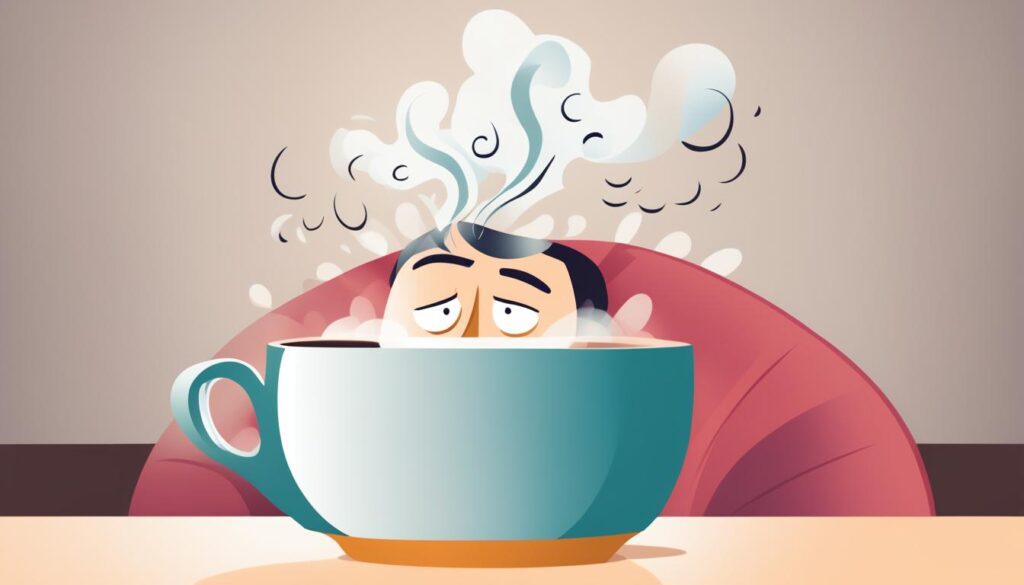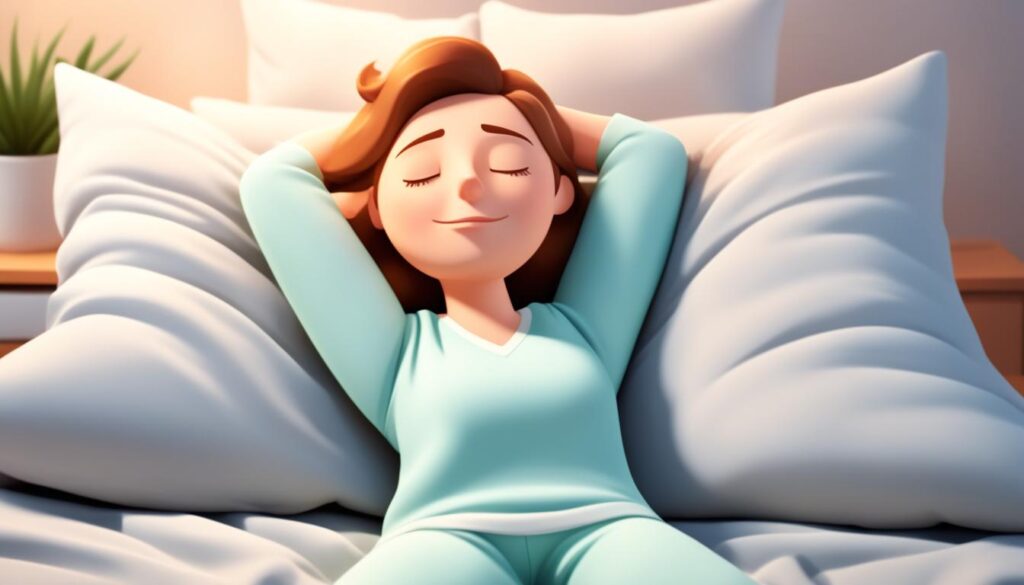Did you know that on average, it takes about 10-20 minutes for a person to fall asleep after getting into bed?
For some, this may seem like a relatively short amount of time. However, if you’re someone who struggles with falling asleep quickly, those precious minutes can feel like an eternity.
Whether you find yourself tossing and turning, unable to shut off your thoughts, or simply staring at the ceiling in frustration, the struggle to fall asleep can be incredibly frustrating.
That’s why we’ve put together a list of tips and techniques to help you fall asleep faster and improve the quality of your sleep. From establishing a consistent sleep-wake schedule to incorporating relaxation techniques into your bedtime routine, we’ve got you covered.
Read on to discover the strategies that can finally help you achieve the restful night’s sleep you’ve been longing for.
Key Takeaways:
- Stick to a consistent sleep-wake schedule to optimize sleep quality.
- Avoid looking at screens before bedtime to prevent interference with melatonin production.
- Limit caffeine intake, especially in the afternoon, to promote better sleep.
- Exercise regularly, but not too close to bedtime, for improved sleep quality.
- Incorporate relaxation techniques into your bedtime routine to calm the mind and body.
Consistent Sleep-Wake Schedule
Your circadian rhythm, the 24-hour cycle that dictates when you sleep and wake, plays a crucial role in falling asleep quickly. By going to bed and waking up at the same time every day, including weekends, you can align your sleep schedule with your circadian rhythm and improve sleep quality.
This consistent routine helps your body know when it should be awake and when it should be asleep, setting the stage for quicker and easier sleep initiation.
Having a consistent sleep-wake schedule is like having a regular clock for your body. It helps regulate your circadian rhythm, which is responsible for controlling various biological processes, including sleep. When you maintain a consistent sleep schedule, your body gets accustomed to the specific times you go to bed and wake up, making it easier to fall asleep and wake up naturally.
Moreover, aligning your sleep schedule with your circadian rhythm allows you to take advantage of natural dips and peaks in your alertness level throughout the day. When you adhere to a consistent sleep routine, your body starts to release melatonin, a hormone that induces sleepiness, at the right time each evening. This helps you feel drowsy and ready for bed, making it easier to fall asleep quickly.
Additionally, a consistent sleep-wake schedule helps regulate other aspects of your body’s internal clock, such as hormone production, body temperature, and metabolism. When these processes are in sync, they promote optimal sleep quality and overall well-being.
To establish a consistent sleep-wake schedule:
- Set a regular bedtime and stick to it, even on weekends.
- Wake up at the same time every day, avoiding oversleeping or excessive napping.
- Create a relaxing bedtime routine that signals to your body that it’s time to wind down and prepare for sleep.
- Avoid stimulants, such as caffeine and nicotine, close to bedtime.
By prioritizing a consistent sleep-wake schedule, you can optimize your circadian rhythm and improve your sleep quality, ultimately leading to better overall health and well-being.
Screens and Sleep
Avoid looking at screens, such as phones, tablets, and laptops, before bedtime. Screens emit blue light, which can interfere with the production of melatonin, the hormone that regulates sleep. This can disrupt your circadian rhythm and make it harder to fall asleep. Instead, opt for activities that promote relaxation and dim the lights to signal to your brain that it’s time to wind down and prepare for sleep.

The Effects of Blue Light
Research has shown that exposure to blue light from screens, especially in the evening, can suppress the production of melatonin. Melatonin is a hormone that helps regulate your sleep-wake cycle and signals to your body that it’s time to sleep. When you expose yourself to screens before bedtime, the artificial blue light can disrupt melatonin production, tricking your brain into thinking it’s still daytime and making it more difficult to fall asleep.
“The more time we spend with screens before bedtime, the more it can impact the quality of our sleep. It’s important to create a screen-free wind-down routine and replace screen time with activities that relax the mind and promote restful sleep.”
To improve your sleep quality, consider implementing the following strategies:
- Avoid screens at least one hour before bedtime
- Engage in relaxing activities such as reading a book, listening to calming music, or taking a warm bath
- Create a peaceful sleep environment with dim lighting and comfortable bedding
By making these small adjustments to your evening routine, you can promote healthy melatonin production, maintain a consistent sleep schedule, and ultimately improve your overall sleep quality.
| Effects of Screens Before Bedtime | Strategies to Improve Sleep Quality |
|---|---|
| Disrupts melatonin production | Avoid screens at least one hour before bedtime |
| Interferes with circadian rhythm | Engage in relaxing activities such as reading or listening to calming music |
| Increases difficulty in falling asleep | Create a peaceful sleep environment with dim lighting |
Caffeine and Sleep
If you’re struggling to fall asleep or have restless nights, your caffeine intake may be to blame. Caffeine is a stimulant that can interfere with sleep initiation and reduce overall sleep quality. To improve your sleep, it’s important to limit your caffeine consumption, especially in the afternoon.
Caffeine has a half-life of four to five hours, which means it can stay in your system for a significant amount of time. Consuming caffeine in the afternoon can disrupt your ability to fall asleep and can lead to a restless night.
To ensure better sleep quality, aim to consume no more than three cups of coffee per day. Additionally, it’s best to avoid consuming caffeine after lunchtime. By reducing your overall caffeine intake and cutting it off in the afternoon, you give your body enough time to metabolize the stimulant before bedtime.
Benefits of Reducing Caffeine Intake
Lowering your caffeine intake can have several positive effects on your sleep:
- Improved Sleep Depth: By reducing caffeine, you allow your body to enter deeper stages of sleep, leading to more restorative rest.
- Reduced Nighttime Awakenings: Caffeine can cause frequent awakenings during the night. By cutting back on caffeine, you’ll experience fewer interruptions and have a more uninterrupted sleep.
- Decreased Sleep Latency: Sleep latency refers to the time it takes to fall asleep. By limiting caffeine, you can shorten this time and fall asleep faster.
“Reducing caffeine intake can have a significant impact on your sleep quality. By making a few changes to your caffeine consumption habits, you can enjoy improved sleep and wake up feeling more refreshed.”

To improve your sleep quality, make a conscious effort to monitor and limit your caffeine intake throughout the day. By being mindful of the timing and quantity of caffeine you consume, you can enjoy a better night’s sleep and wake up feeling energized.
Exercise and Sleep
Engaging in regular exercise can greatly improve your sleep quality. However, it’s crucial to time your exercise appropriately to avoid any negative impact on your bedtime routine. Exercising too close to bedtime can increase your core body temperature, elevate alertness levels, and make it difficult for you to fall asleep.
To optimize the benefits of exercise on your sleep, it’s recommended that you complete your workout session at least three to four hours before your planned bedtime. This time frame allows your body to gradually cool down, relax, and prepare for sleep, enabling you to fall asleep faster and experience more restful nights.
Why Does Timing Matter?
The timing of exercise plays a key role in the relationship between physical activity and sleep quality. When you exercise, your body releases endorphins, which can boost energy levels and increase alertness. Additionally, physical activity raises your core body temperature. While these effects are beneficial during the day, they can hinder your ability to wind down and fall asleep if exercise is performed too close to bedtime.
Bedtime Exercise Recommendations
Here are some bedtime exercise recommendations to promote better sleep quality:
- Engage in aerobic exercises, such as jogging, brisk walking, or cycling, during the earlier part of the day to maximize the positive impact on sleep quality.
- Consider incorporating relaxing activities into your evening routine, such as yoga or gentle stretching, as they can help calm your mind and body before sleep.
- Avoid high-intensity workouts or activities that increase arousal in the hours leading up to bedtime, as they can interfere with your ability to fall asleep.
Remember, finding the right balance of exercise and sleep is essential for overall well-being. By incorporating regular exercise into your daily routine and timing it appropriately, you can improve your sleep quality and wake up feeling refreshed each morning.

| Benefits of Bedtime Exercise | Timing Recommendations |
|---|---|
| Improves sleep quality | Complete workout 3-4 hours before bedtime |
| Reduces stress and anxiety | Avoid high-intensity workouts close to bedtime |
| Enhances relaxation before sleep | Engage in calming activities like yoga |
Relaxation Techniques for Better Sleep
If you’re struggling to fall asleep, incorporating relaxation techniques into your bedtime routine can greatly improve your sleep quality and provide relief from insomnia. There are various relaxation techniques you can try to calm your mind and body before sleep.
Deep breathing exercises: Take slow, deep breaths, focusing on your breath as you inhale and exhale. Deep breathing helps relax your body and release tension, making it easier to drift off into a peaceful sleep.
Meditation: Set aside a few minutes each night to meditate before bed. Find a comfortable position and focus your attention on your breathing or use guided meditation apps to help clear your mind and induce relaxation.
Progressive muscle relaxation: Starting from your toes and moving upward, consciously tense and relax each muscle group in your body. This technique helps release physical tension and promotes a state of deep relaxation, making it easier to fall asleep.
Guided visualizations: Imagine yourself in a peaceful and calming environment, such as a serene beach or a tranquil forest. Visualize the details and sensations of that place, allowing your mind to escape from daily stress and ease into a restful state.
Remember, the key is to experiment with different relaxation techniques and find the ones that work best for you. Incorporating a bedtime routine that includes these techniques can help signal to your body that it’s time to unwind and prepare for a rejuvenating sleep. Prioritizing relaxation can lead to better sleep and improved overall well-being.
You may also like our article: Why Getting Enough Sleep Is Important
FAQ
How can I fall asleep faster?
To fall asleep faster, try sticking to a consistent sleep-wake schedule, avoiding screens before bedtime, limiting caffeine intake in the afternoon, exercising regularly (but not too close to bedtime), and incorporating relaxation techniques into your routine.
Why is a consistent sleep-wake schedule important?
A consistent sleep-wake schedule helps align your sleep with your circadian rhythm, optimizing sleep quality. By going to bed and waking up at the same time every day, even on weekends, your body knows when it should be awake and when it should be asleep.
How do screens affect sleep?
Screens emit blue light that can interfere with the production of melatonin, the hormone that regulates sleep. To improve sleep quality, it’s recommended to avoid looking at screens before bedtime and engage in relaxing activities instead.
Does caffeine impact sleep?
Yes, caffeine is a stimulant that can disrupt sleep initiation and reduce sleep quality. To promote better sleep, limit caffeine intake, especially in the afternoon, and avoid consuming caffeine after lunchtime.
Can exercise help improve sleep quality?
Regular exercise can promote better sleep quality. However, it’s important to time your exercise appropriately. Exercising too close to bedtime can increase alertness, making it harder to fall asleep. Aim to complete your workout at least three to four hours before bedtime.
What relaxation techniques can I use for better sleep?
There are several relaxation techniques you can incorporate into your bedtime routine, such as deep breathing exercises, meditation, progressive muscle relaxation, or guided visualizations. Experiment with different techniques to find what works best for you in promoting relaxation and improving your sleep quality.






